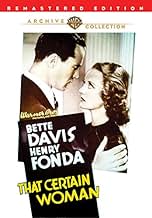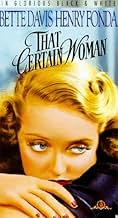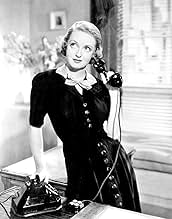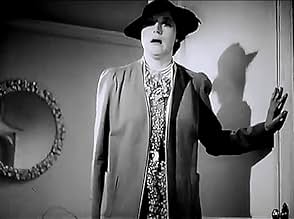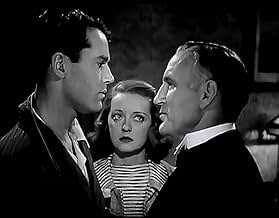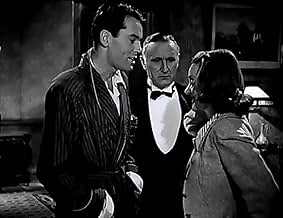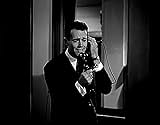IMDb रेटिंग
6.4/10
1.8 हज़ार
आपकी रेटिंग
अपनी भाषा में प्लॉट जोड़ेंMary Donnell, a young legal secretary with a past, elopes with a client's son, but his father has the marriage annulled without knowing she's pregnant.Mary Donnell, a young legal secretary with a past, elopes with a client's son, but his father has the marriage annulled without knowing she's pregnant.Mary Donnell, a young legal secretary with a past, elopes with a client's son, but his father has the marriage annulled without knowing she's pregnant.
- पुरस्कार
- कुल 1 जीत
Katharine Alexander
- Mrs. Rogers
- (as Katherine Alexander)
Mary Philips
- Amy
- (as Mary Phillips)
Richard DeNeut
- Boy
- (as Dickie DeNeut)
John Hamilton
- American
- (काटे गए सीन)
Edward Keane
- Opposing Counsel
- (काटे गए सीन)
फ़ीचर्ड समीक्षाएं
Here, Davis plays a secretary, Mary Donnell, with a past: she was once married to a mobster when she was very young. He is now dead but the press will not let her forget her past and move forward. Jack Merrick , Jr. (Henry Fonda) is in love with Mary. He marries her—promising to stand on his own feet rather than living off of his wealthy father, (Donald Crisp). But Jack's father first forbids the marriage then, after they get married, he has it annulled, and sweeps Jack off to Europe.
However, Mary has Jack's baby and names him Jackie. She is emotionally supported by her maid, Amy (Mary Philips)-who here plays a role something like Thelma Ritter would play in later movies. Mary is also supported by her understanding boss, Lloyd Rogers (Ian Hunter), who has an unhappy marriage and is not-so-secretly in love with Mary. But, his love is unrequited.
As the years pass and little Jackie grows, Mary remains in love with Jack: she can't get him out of her mind. Jack marries in Europe and he and his wife, 'Flip' (Anita Louise), are in a bad car accident that leaves her in a wheelchair for life. When Jack and Amy return to America, they both re-enter Mary's life: Jack is introduced to, and falls in love with, his 4-year-old son. 'Flip' makes a point of visiting Mary to ask her to marry Jack so that he can have a 'full life' with Mary and little Jackie.
This is one of those Bette Davis melodramas in which she is asked to make personal sacrifice(s), but the movie has too MANY of these moments. In fact until the end, we are left wondering who she will have to sacrifice: Jack?—Jackie?—both?-neither? The only 'villains' of this movie are Jack's father, who continually foils the love between Mary and Jack, and the tabloid newspaper reporters who won't leave Mary alone.
Surprisingly, the other women, of the movie (Mrs. Rogers, Flip, and even Amy)--who should resent Mary--are always way TOO understanding towards her. Not only does the movie suffer from an excess of these moments but the ending is WAY contrived too.
It's too bad, because the movie seemed to show some promise at the beginning. All this aside, Bette Davis' acting is still the great stuff that we have learned to expect from her.
However, Mary has Jack's baby and names him Jackie. She is emotionally supported by her maid, Amy (Mary Philips)-who here plays a role something like Thelma Ritter would play in later movies. Mary is also supported by her understanding boss, Lloyd Rogers (Ian Hunter), who has an unhappy marriage and is not-so-secretly in love with Mary. But, his love is unrequited.
As the years pass and little Jackie grows, Mary remains in love with Jack: she can't get him out of her mind. Jack marries in Europe and he and his wife, 'Flip' (Anita Louise), are in a bad car accident that leaves her in a wheelchair for life. When Jack and Amy return to America, they both re-enter Mary's life: Jack is introduced to, and falls in love with, his 4-year-old son. 'Flip' makes a point of visiting Mary to ask her to marry Jack so that he can have a 'full life' with Mary and little Jackie.
This is one of those Bette Davis melodramas in which she is asked to make personal sacrifice(s), but the movie has too MANY of these moments. In fact until the end, we are left wondering who she will have to sacrifice: Jack?—Jackie?—both?-neither? The only 'villains' of this movie are Jack's father, who continually foils the love between Mary and Jack, and the tabloid newspaper reporters who won't leave Mary alone.
Surprisingly, the other women, of the movie (Mrs. Rogers, Flip, and even Amy)--who should resent Mary--are always way TOO understanding towards her. Not only does the movie suffer from an excess of these moments but the ending is WAY contrived too.
It's too bad, because the movie seemed to show some promise at the beginning. All this aside, Bette Davis' acting is still the great stuff that we have learned to expect from her.
In spite of it's impressive leads and the usually sure handed direction of Edmund Goulding That Certain Kind of Women is a lumbering, mawkish an implausible melodrama. Disjointed at times you get the feeling a reels missing.
Where do we begin. Ex-moll Mary Donnell is trying to go straight as an executive secretary for Lloyd Rogers who though married has a thing for Mary. Mary though falls for Jack Merrrick Jr. (Henry Fonda) much to the chagrin of Jack Sr. (Donald Crisp) who gets sonny's marriage annulled by playing hardball with her past. The two part he remarries and she has his kid. Years pass, Rogers dies and leaves her a ton of cash. Junior comes back finds out and vows to leave his crippled wife who pays a visit to Mary before they run off. Enough already.
Your drowning in suds in no time in this 30s chick flic that never finds a way to amp up the passion with characters that are tender sensitive and dull beyond belief. Davis stands around looking cow eyed most of the way while Fonda wimps about and Crisp remains stone like. Tina Louise rolls in on a wheelchair in the last act as wife "Flipp" and wrestles with Davis in another cloying moment of tear jerk to see who will make the greater sacrifice. No contest, the audience has.
Where do we begin. Ex-moll Mary Donnell is trying to go straight as an executive secretary for Lloyd Rogers who though married has a thing for Mary. Mary though falls for Jack Merrrick Jr. (Henry Fonda) much to the chagrin of Jack Sr. (Donald Crisp) who gets sonny's marriage annulled by playing hardball with her past. The two part he remarries and she has his kid. Years pass, Rogers dies and leaves her a ton of cash. Junior comes back finds out and vows to leave his crippled wife who pays a visit to Mary before they run off. Enough already.
Your drowning in suds in no time in this 30s chick flic that never finds a way to amp up the passion with characters that are tender sensitive and dull beyond belief. Davis stands around looking cow eyed most of the way while Fonda wimps about and Crisp remains stone like. Tina Louise rolls in on a wheelchair in the last act as wife "Flipp" and wrestles with Davis in another cloying moment of tear jerk to see who will make the greater sacrifice. No contest, the audience has.
Yes, it's a ridiculous, confusing plot. Yes, the characterizations are clichéd archetypes. The portrayal of her son shows a child yanked around with what we would see today as neglect, or even cruelty. But David fully commits, and elevates the entire enterprise. She is showcased, and provides a subtlety and range of emotion far beyond the script, e.g., she makes her interaction with the child actor believable. Fonda hangs in there, but his character doesn't give him much to work with. And some scenes rise to her level -- especially the conversation with Anita Louise in her wheelchair. We see the characters reacting to one another in an unlikely and awkward plot contrivance, and simultaneously see two skilled actresses working together to make all this believable and even moving. Plus, the wheelchair action is ... remarkable. Davis looks great, beautifully photographed, well-lit, with the famous eyes showcased repeatedly, to great effect. The finale has to be seen to be believed. What the involved viewer expected - and dreaded - is suddenly revealed to have taken place, and the effect is -- hilarious relief. Certainly not a great film, but essential for those who appreciate and admire Davis.
Was actually expecting quite a lot from 'That Certain Woman'. Yes it did sound very melodramatic, but there was a good deal of talent involved. Bette Davis gave many great performances, the best of which legendary status, as did Donald Crisp, who did a lot of big supporting roles in a varying filmography (but nearly always one of the better things about the not so good films). Henry Fonda was no stranger to good performances either and Edmund Goulding's other collaborations with Davis ranged from above average to great.
Not so sadly with 'That Certain Woman', which is perhaps their weakest collaboration. Through no fault of Davis, who is actually the best thing about it, there are other good things and it started off promisingly. All of that is unfortunately undermined by the film falling apart in the second half, where the amount of soap suds that lingers even after the film is over leaves a bitter aftertaste and the character writing certainly should have much more balanced and less simplistic.
Davis is as said the best thing about 'That Certain Woman' and is quite wonderful. A wide range of emotions very powerfully conveyed, even when the film falls apart. It is such a shock seeing Crisp play such an unpleasant character, he plays him very well and menacingly without overacting. The other female characters are sympathetically portrayed, especially Anita Louise.
'That Certain Woman' is lovingly made, with a real sense of mood in the photography and the production values overall have a lot of class. Max Steiner's score is sumptuous and swells and sweeps in distinctive fashion. Goulding directs tastefully in the first half, which is quite charming and affecting.
All that is undone in the second half, where the melodrama gets excessively heavy, the sentimentality makes for at two trips to the bathroom to try and wash out the soap suds welling up in the mouth and things do get silly to the point of ridiculousness. The amount of self-sacrifices Mary makes is so much that it becomes nauseating. The ending somehow rings false and is especially mawkish. The script gets increasingly stilted and soapy, and the momentum in the pace really goes.
Fonda looks uncomfortable in a role that really does not suit him, got the sense too that he himself knew that. Ian Hunter has too little to work with and doesn't have an awful lot of presence, at least he fares better than Fonda. Did have a problem with how the characters are written, especially the male ones, where too few of the characters have much dimension and are either written as too perfect or too cruel.
On the whole, watchable but with a lot that doesn't work. 5/10
Not so sadly with 'That Certain Woman', which is perhaps their weakest collaboration. Through no fault of Davis, who is actually the best thing about it, there are other good things and it started off promisingly. All of that is unfortunately undermined by the film falling apart in the second half, where the amount of soap suds that lingers even after the film is over leaves a bitter aftertaste and the character writing certainly should have much more balanced and less simplistic.
Davis is as said the best thing about 'That Certain Woman' and is quite wonderful. A wide range of emotions very powerfully conveyed, even when the film falls apart. It is such a shock seeing Crisp play such an unpleasant character, he plays him very well and menacingly without overacting. The other female characters are sympathetically portrayed, especially Anita Louise.
'That Certain Woman' is lovingly made, with a real sense of mood in the photography and the production values overall have a lot of class. Max Steiner's score is sumptuous and swells and sweeps in distinctive fashion. Goulding directs tastefully in the first half, which is quite charming and affecting.
All that is undone in the second half, where the melodrama gets excessively heavy, the sentimentality makes for at two trips to the bathroom to try and wash out the soap suds welling up in the mouth and things do get silly to the point of ridiculousness. The amount of self-sacrifices Mary makes is so much that it becomes nauseating. The ending somehow rings false and is especially mawkish. The script gets increasingly stilted and soapy, and the momentum in the pace really goes.
Fonda looks uncomfortable in a role that really does not suit him, got the sense too that he himself knew that. Ian Hunter has too little to work with and doesn't have an awful lot of presence, at least he fares better than Fonda. Did have a problem with how the characters are written, especially the male ones, where too few of the characters have much dimension and are either written as too perfect or too cruel.
On the whole, watchable but with a lot that doesn't work. 5/10
Secretary Bette Davis has her dishonorable past unearthed after a reporter breaks the story that she's the widow of a notorious gangster once involved in the St. Valentine's Day Massacre; this leads to the quick dissolution of Davis' even quicker marriage to Henry Fonda, but not before Bette can conceive a child! A few dry, amusing wisecracks in this remake of the silent drama "The Trespasser"--and some unintended laughs and head-scratching details as well. Davis keeps refusing offers of cigarettes (!), she types a letter to Fonda we never get to read, she packs her kid off without his toys and then blows forlornly on his whistle. The kid is a solemn tyke who seems to have a fixation on being a sailor, even while Fonda's new wife pays Davis a visit (in a wheelchair!) and trades confessions with her in front of a roaring fire which never seems to die down. Busy programmer would not be of much interest were it not for Bette's terrific performance; she's serious and focused--and sensitive when she should be--and she grounds this story in a bit of reality. Henry Fonda and the supporting players are also very good, especially Mary Phillips as Amy. The film opens confusingly and takes a while to get its bearings, yet the sequence where Bette meets her father-in-law for the first time is a superbly controlled dramatic moment in which everyone excels. Not a particularly witty or gripping picture, but certainly not bad, either. **1/2 from ****
क्या आपको पता है
- ट्रिवियाWith Bette Davis rising quickly through the ranks at Warner Brothers, she was able to choose her leading men, and for That Certain Woman (1937) she chose Henry Fonda. Their lives had intersected a decade earlier when they worked in the same New England summer stock company. Even before that portion of their lives, they had met when Fonda gave the 17-year-old Davis a tour of Princeton University. One night, Fonda later wrote, while he and a friend took Davis and her sister out for a tour of the campus by moonlight, he nervously gave Davis an innocent kiss on the lips. A few days later he received a letter from her: "I've told mother about our lovely experience together in the moonlight. She will announce the engagement when we get home." Fonda was so naïve that he wasn't sure at first whether this was a joke! Davis remembered and liked Fonda enough to request him for this film and then again for Jezebel (1938).
- गूफ़The screen shows a newspaper page with headlines, photographs, and a box in large type, all part of a full-page gangster story. However, only some of the text that can be seen around the edges is part of the story. The rest is "dummy" type, about clothes for college men or electrical equipment.
- भाव
Lloyd Rogers: [to Mary] Money! I've got loads of it, and I'm one of the unhappiest men in the world!
- क्रेज़ी क्रेडिटThe opening credits roll up.
- कनेक्शनFeatured in Breakdowns of 1938 (1938)
- साउंडट्रैक'Cause My Baby Says It's So
(1937) (uncredited)
Music by Harry Warren
Played during the scene at the bar
टॉप पसंद
रेटिंग देने के लिए साइन-इन करें और वैयक्तिकृत सुझावों के लिए वॉचलिस्ट करें
- How long is That Certain Woman?Alexa द्वारा संचालित
विवरण
- रिलीज़ की तारीख़
- कंट्री ऑफ़ ओरिजिन
- भाषा
- इस रूप में भी जाना जाता है
- Aquella mujer
- फ़िल्माने की जगहें
- उत्पादन कंपनी
- IMDbPro पर और कंपनी क्रेडिट देखें
- चलने की अवधि1 घंटा 33 मिनट
- रंग
- ध्वनि मिश्रण
- पक्ष अनुपात
- 1.37 : 1
इस पेज में योगदान दें
किसी बदलाव का सुझाव दें या अनुपलब्ध कॉन्टेंट जोड़ें



